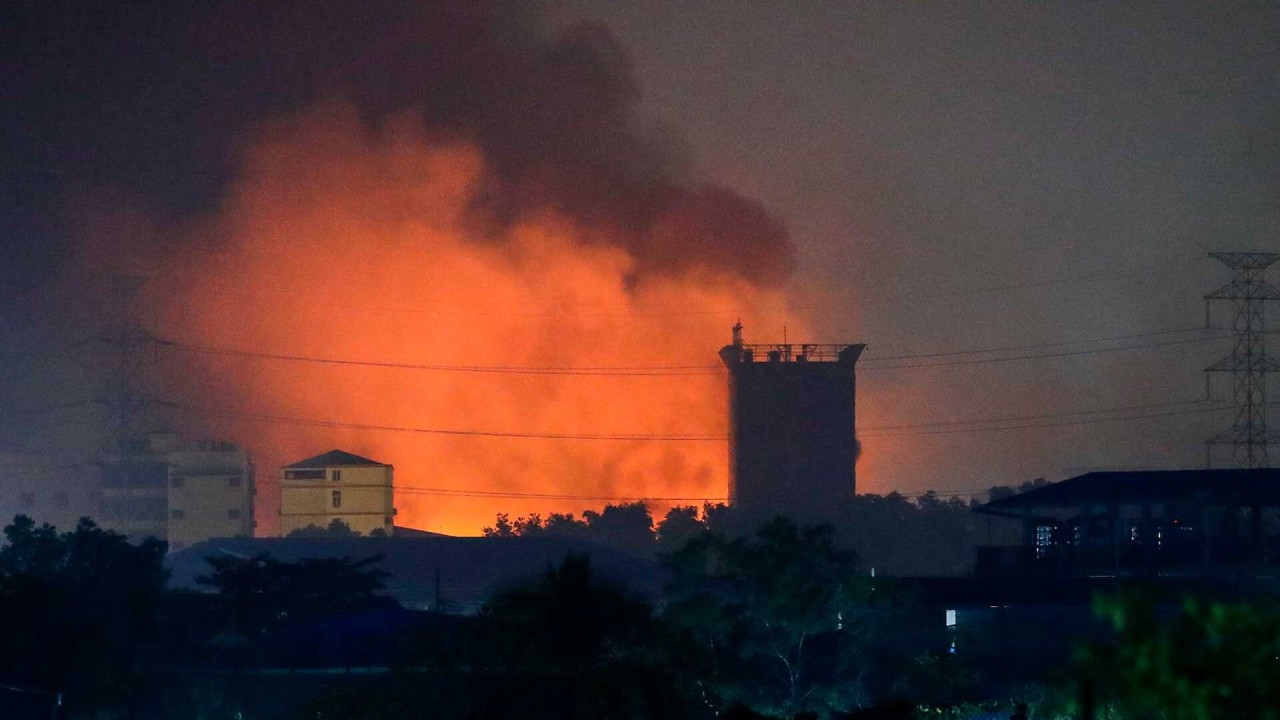
China’s private security firms to shield against ‘terrorist sabotage’ as Xi Jinping looks to protect overseas assets
- More former People’s Liberation Army and police members could serve as mercenaries overseas as China aims to protect its assets and people abroad
- Private security is said to be in the early stages of being useful as a strategic tool for Beijing to project power and protect its interests abroad
Private security firms will play a much more significant role in protecting assets related to China’s ambitious Belt and Road Initiative after President Xi Jinping discussed enhancing overseas security at the 20th party congress, according to analysts.
The total market value of global private military or security companies is between US$100 billion and US$244 billion, according to a report released this month by Washington-based Jamestown Foundation, a conservative defence policy think tank.
China, Latin America and Asia-Pacific countries were also expected to account for the largest growth in overseas security spending between 2019 and 2023, according to information from the International Data Corporation, a global market-intelligence firm, that was cited in a 2020 report by the Carnegie Endowment for International Peace think tank.
And Paul Nantulya, a research associate with the Africa Centre for Strategic Studies in Washington, said that China’s strategic shift from keeping a low profile to claiming global leadership sets the stage for the expansion of Chinese overseas security contracting.
“There will be more recruitment of security firms run by ex-People’s Liberation Army and ex-Chinese police to provide security for Chinese state-owned enterprises involved in implementing the Belt and Road Initiative’s multimillion-dollar programmes,” Nantulya said.
Findings from the Peace Research Institute in Frankfurt also point to investments in belt and road projects being massively over-concentrated in unstable or conflict-affected environments such as Pakistan, Myanmar, Nigeria and Sri Lanka.
“The Belt and Road Initiative’s presence in conflict environments and the contentiousness of its projects expose them to unique dangers, which create a natural market for protection services.”
Speaking during the 20th party congress, Xi said: “We will strengthen our capacity to ensure overseas security and protect the lawful rights and interests of Chinese citizens and legal entities overseas.”
The Belt and Road Initiative has created and sustained a demand for Chinese private security companies abroad
The Belt and Road Initiative – Beijing’s grand infrastructure connectivity plan – makes for an easy link to local disorder along its investment spots.
“The Belt and Road Initiative has created and sustained a demand for Chinese private security companies abroad,” said Aaron Magunna, a research analyst at the European Foundation for South Asian Studies.
He pointed out that such services are also being used to protect assets related to the initiative in Southeast Asia, with a presence in Cambodia being particularly pronounced.
Figures from the Peace Research Institute Oslo show that there are already about 5,000 security firms registered in China, employing more than 4 million personnel – former members of the People’s Liberation Army and the People’s Armed Police.
“About 20 [security firms in China] are licenced to operate overseas, and they employ over 3,000 individual contractors, although the real number is likely to be higher,” added Ilaria Carrozza, senior researcher at the private research institution in Norway.
Private security companies are well-positioned tools for Beijing to project power abroad when the Chinese government is unwilling to deploy the People’s Liberation Army overseas, according to a January analysis by the Centre for Strategic and International Studies think tank in Washington.
Civil-military integration could eventuate, particularly in protecting the Belt and Road Initiative assets from terrorist sabotage
Abb in Frankfurt added that senior Chinese authorities have been speaking for years about the need to bolster overseas security.
“Han Fangming at the Chinese People’s Political Consultative Conference has been calling for a ‘supply-side’ reform of Chinese private security companies,” Abb said.
In a 2015 report, Han, who is now head of the Charhar Institute think tank in Beijing, called for the deregulation of private security companies in China, and for the establishment of joint ventures with local security firms, Abb said.
Rosita Dellios, an associate professor of international relations at Bond University in Australia, said that there is rising interest in this form of security worldwide, but China is in the early stages of using such services.
“In an unregulated environment outside of China, private security companies could theoretically become ‘private’,” she added. “But in practice, [the] civil-military integration could eventuate, particularly in protecting the Belt and Road Initiative assets from terrorist sabotage.”
Chinese private security companies are latecomers compared with those of the United States and various international firms, Abb said, so it is a problem of lacking local experience, contacts and acceptance.
Regarding local assimilation, Zhang Yifan, an economics professor with the Chinese University of Hong Kong, suggested that the Belt and Road Initiative should also be “a road of culture and friendship”.
“China can do more to accommodate the local cultures of these countries,” he said, adding that investing in the preservation of cultural heritage could help offset “backlash” from local people.
The Belt and Road Initiative is a signature international programme that may scale down, but it won’t disappear
Echoing that perspective, Qiu Dongxiao, head of economics at Lingnan University in Hong Kong, said: “China should build better people-to-people relationships in the Belt and Road Initiative countries”, on top of infrastructure investment.
But even in the face of overseas discontent stemming from belt and road projects, Nantulya with Washington’s Africa Centre for Strategic Studies said that Xi’s 20th party congress speech has reconfirmed China’s singular national effort to reshape global security norms and practices.
“The Belt and Road Initiative is a signature international programme that may scale down, but it won’t disappear,” he added.


